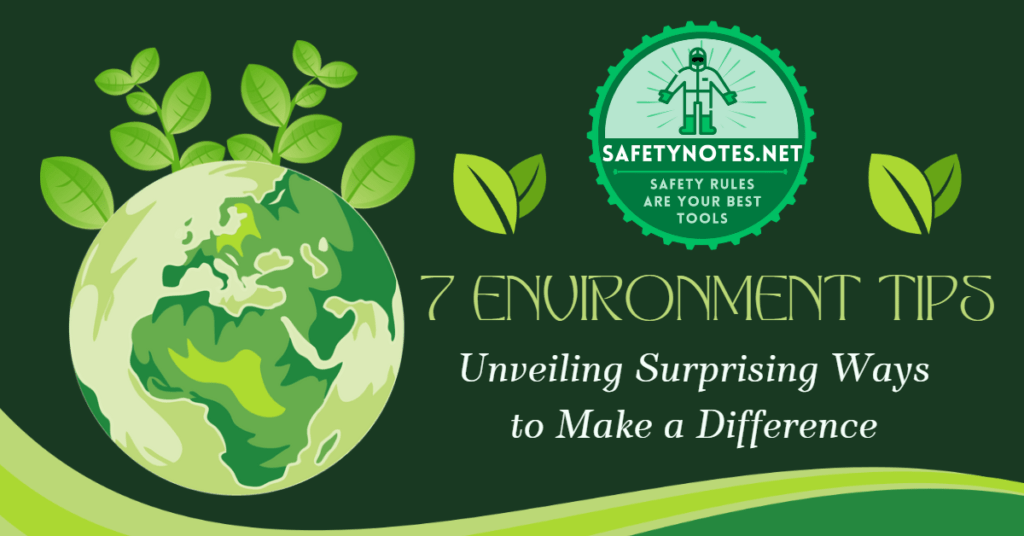
Introduction
The importance of environmental conservation
Our planet is facing numerous environmental challenges, from climate change to plastic pollution. It’s crucial that we take action to protect our environment and preserve it for future generations.
The need for practical and effective tips
Many people want to help the environment but are unsure of how to make a real difference. That’s why we’ve compiled a list of 7 Environment Safety Tips You Won’t Believe Actually Work. These tips are simple, practical, and can have a significant impact when implemented consistently.
Tip 1: Plant trees and maintain green spaces
The environmental impact of deforestation
Deforestation is a major contributor to climate change, habitat loss, and soil erosion. By planting trees and maintaining green spaces, we can help mitigate these negative effects and promote a healthier environment.
Benefits of planting trees and maintaining green spaces
Planting trees and maintaining green spaces not only benefits the environment but also improves our health and well-being. Trees absorb carbon dioxide and release oxygen, which helps combat climate change. Additionally, green spaces provide habitat for wildlife, improve air quality, and offer recreational opportunities for people to connect with nature.
Tip 2: Choose eco-friendly transportation
The role of transportation in pollution
Transportation is a significant source of air pollution and greenhouse gas emissions. By opting for eco-friendly transportation options, we can help reduce our impact on the environment.
Alternatives to traditional vehicles
Consider using public transportation, biking, or walking whenever possible. If you must drive, choose a fuel-efficient or electric vehicle.
Tip 3: Practice energy conservation
The significance of energy consumption
Energy production is a major source of greenhouse gas emissions and pollution. By conserving energy, we can help combat climate change and reduce our impact on the environment.
Simple ways to save energy
- Turn off lights and electronics when not in use
- Use energy-efficient appliances and light bulbs
- Unplug chargers and devices when not in use
Tip 4: Reduce, reuse, and recycle
The importance of waste management
Waste production contributes to pollution, resource depletion, and environmental degradation. By reducing our waste output, we can help protect our environment and conserve valuable resources.
Practical steps for waste reduction
- Avoid single-use items
- Reuse items whenever possible
- Recycle properly and consistently
Tip 5: Support sustainable companies
The impact of consumer choices
Our purchasing decisions have a significant impact on the environment. By supporting eco-friendly companies, we can help drive change and promote sustainable practices.
Identifying eco-friendly brands
Look for companies that prioritize sustainability, use eco-friendly materials, and have transparent supply chains.
Tip 6: Participate in community cleanups
The benefits of a clean environment
A clean environment is essential for our health and well-being. By participating in community cleanups, we can help protect our local ecosystems and promote environmental awareness.
How to get involved in cleanups
Join local environmental organizations or participate in cleanup events in your community.
Tip 7: Educate yourself and others
The power of knowledge
Knowledge is power, and staying informed about environmental issues is essential for making a positive impact. Educate yourself on the latest environmental news and research, and share this information with others.
Sharing information with others
Talk to friends, family, and coworkers about the importance of environmental conservation and the steps they can take to help. Share resources and tips on social media to spread awareness.
Conclusion
The collective impact of individual actions
While it may seem like individual actions can’t make a significant difference, the collective impact of our efforts can create lasting change. By implementing these 7 Environment Safety Tips You Won’t Believe Actually Work, we can work together to protect and preserve our planet for future generations.
The importance of continued efforts
Environmental conservation is an ongoing effort, and it’s crucial that we continue to take action and adapt our behaviors to minimize our impact on the planet.
Frequently Asked Questions (FAQs)
1. How can I start implementing these environment tips in my daily life?
Start by incorporating one or two tips at a time into your routine, such as using reusable bags when shopping or turning off lights when not in use. Once you’ve made these habits, gradually add more tips to your daily life. Remember, small changes can make a big difference over time.
2. Can I really make a difference by following these environment tips?
Yes, you can! While individual actions may seem insignificant, the collective impact of everyone making small changes can lead to significant improvements in our environment. By adopting these tips and encouraging others to do the same, you’re contributing to a healthier planet for future generations.
3. How can I get my friends and family involved in environmental conservation?
Share your knowledge and passion for the environment with them. Discuss the importance of environmental conservation and the simple steps they can take to help. Encourage them to join you in implementing these tips or participating in community cleanups and other environmental events.
4. Are there any additional resources to help me learn more about environmental conservation?
There are numerous resources available online to help you learn more about environmental conservation. Websites such as the Environmental Protection Agency (EPA) offer valuable information on various environmental topics.
5. What should I do if I encounter resistance or skepticism when discussing environmental issues with others?
It’s essential to approach these conversations with empathy and understanding. Remember that not everyone has the same level of knowledge or awareness about environmental issues. Be patient, provide reliable information, and share your personal experiences to help them understand the importance of environmental conservation. Encourage open dialogue and be open to different perspectives.
